
The Message: The Bible in Contemporary Language (MSG) is a paraphrase of the Bible in contemporary English. Authored by Eugene H. Peterson and published in segments from 1993 to 2002.

Psalm 23 is the 23rd psalm of the Book of Psalms, beginning in English in the King James Version: "The Lord is my shepherd". In Latin, it is known by the incipit, "Dominus regit me". The Book of Psalms is part of the third section of the Hebrew Bible, and a book of the Christian Old Testament. In the slightly different numbering system used in the Greek Septuagint and Latin Vulgate translations of the Bible, this psalm is Psalm 22.

Psalm 89 is the 89th psalm of the Book of Psalms, beginning in English in the King James Version: "I will sing of the mercies of the LORD for ever". In the slightly different numbering system used in the Greek Septuagint and Latin Vulgate translations of the Bible, this psalm is Psalm 88. In Latin, it is known as "Misericordias Domini in aeternum cantabo". It is described as a maschil or "contemplation".

Psalm 109 is a psalm in the Book of Psalms, beginning in English in the King James Version: "Hold not thy peace, O God of my praise". In the slightly different numbering system used in the Greek Septuagint version of the Bible and in the Latin Vulgate, this psalm is Psalm 108. In Latin, it is known as "Deus, laudem". It is attributed to King David and noted for containing some of the most severe curses in the Bible, such as verses 12 and 13. It has traditionally been called the "Judas Psalm" or "Iscariot Psalm" for an interpretation relating verse 8 to Judas Iscariot's punishment as noted in the New Testament.
The books of the New Testament frequently cite Jewish scripture to support the claim of the Early Christians that Jesus was the promised Jewish Messiah. Scholars have observed that few of these citations are actual predictions in context; the majority of these quotations and references are taken from the prophetic Book of Isaiah, but they range over the entire corpus of Jewish writings.

Psalm 69 is the 69th psalm of the Book of Psalms, beginning in English in the King James Version: "Save me, O God; for the waters are come in unto my soul". It is subtitled: "To the chief musician, upon Shoshannim, a Psalm of David". The Book of Psalms is part of the third section of the Hebrew Bible, and a book of the Christian Old Testament. In the slightly different numbering system used in the Greek Septuagint version of the Bible and in the Latin Vulgate, this psalm is Psalm 68. In Latin, it is known as "Salvum me fac Deus". It has 36 verses.

Psalm 13 is the 13th psalm of the Book of Psalms, beginning in English in the King James Version (KJV): "How long, O Lord". The Book of Psalms is part of the third section of the Hebrew Bible, and a book of the Christian Old Testament. In the Greek Septuagint and the Latin Vulgate, this psalm is Psalm 12 in a slightly different numbering system. In Latin, it is known as "Usquequo Domine".

Psalm 17 is the 17th psalm of the Book of Psalms, beginning in English in the King James Version: "Hear the right, O LORD, attend unto my cry". In the Greek Septuagint and the Latin Vulgate, it is psalm 16 in a slightly different numbering system, "Exaudi Domine iustitiam meam". Its authorship is traditionally assigned to King David.
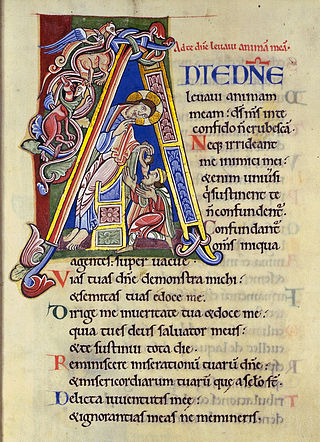
Psalm 25 is the 25th psalm of the Book of Psalms, beginning in English in the King James Version: "Unto thee, O LORD, do I lift up my soul.". The Book of Psalms is part of the third section of the Hebrew Bible, and a book of the Christian Old Testament. In the slightly different numbering system used in the Greek Septuagint and Latin Vulgate translations of the Bible, this psalm is Psalm 24. In Latin, it is known as "Ad te Domine levavi animam meam". The psalm, attributed to David, has the form of an acrostic Hebrew poem.
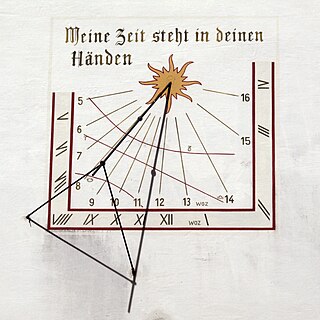
Psalm 31 is the 31st psalm of the Book of Psalms, beginning in English in the King James Version: "In thee, O LORD, do I put my trust". In Latin, it is known as "In te Domine speravi". The Book of Psalms is part of the third section of the Hebrew Bible, and a book of the Christian Old Testament. In the slightly different numbering system used in the Greek Septuagint version of the Bible, and in its Latin translation, the Vulgate, this psalm is Psalm 30. The first verse in the Hebrew text indicates that it was composed by David.
Psalm 35 is the 35th psalm of the Book of Psalms, beginning in English in the King James Version: "Plead my cause, O LORD, with them that strive with me: fight against them that fight against me." It is titled there: The Lord the Avenger of His People. The Book of Psalms is part of the third section of the Hebrew Bible, and a book of the Christian Old Testament. In the slightly different numbering system used in the Greek Septuagint and Latin Vulgate translations of the Bible, this psalm is Psalm 34. In Latin, it is known by the incipit, "Iudica Domine nocentes me". It is generally attributed to King David, although some commentators attribute it to the prophet Jeremiah.
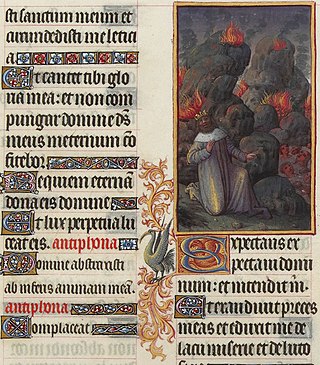
Psalm 40 is the 40th psalm of the Book of Psalms, beginning in English in the King James Version: "I waited patiently for the LORD". The Book of Psalms is part of the third section of the Hebrew Bible, and a book of the Christian Old Testament. In the slightly different numbering system used in the Greek Septuagint and Latin Vulgate translations of the Bible, this psalm is Psalm 39. In Latin, it is known by the incipit, "Expectans expectavi Dominum". It is described by the Jerusalem Bible as a "song of praise and prayer for help".

Psalm 54 is the 54th psalm of the Book of Psalms, beginning in English in the King James Version: "Save me, O God, by thy name, and judge me by thy strength". In the slightly different numbering system used in the Greek Septuagint and Latin Vulgate translations of the Bible, this psalm is Psalm 53. In Latin, it is known as "Deus in nomine tuo salvum me fac", Attributed to David, it was written for one who finds oneself betrayed by a friend.
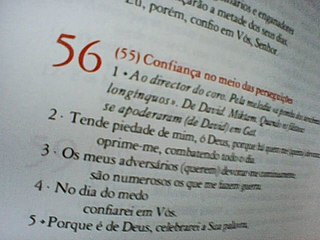
Psalm 56 is the 56th psalm of the Book of Psalms, beginning in English in the King James Version: "Be merciful unto me, O God: for man would swallow me up". In the slightly different numbering system of the Greek Septuagint version of the Bible and the Latin Vulgate, this psalm is Psalm 55. In Latin, it is known as "Miserere mei Deus quoniam conculcavit me homo". The psalm is the first of a series of five psalms in this part of the book which are referred to as Miktams. It is attributed to King David and may be considered representative of him or anyone else hiding from an enemy.

Psalm 71 is the 71st psalm of the Book of Psalms, beginning in English in the King James Version: "In thee, O LORD, do I put my trust: let me never be put to confusion". It has no title in the Hebrew version. In the slightly different numbering system used in the Greek Septuagint and Latin Vulgate translations of the Bible, this psalm is Psalm 70. In Latin, it is known as "In te Domine speravi".

Psalm 88 is the 88th psalm of the Book of Psalms, beginning in English in the King James Version: "O LORD God of my salvation, I have cried day and night before thee". In the slightly different numbering system used in the Greek Septuagint and Latin Vulgate translations of the Bible, this psalm is Psalm 87. In Latin, it is known as "Domine Deus salutis meae". According to the title, it is a "psalm of the sons of Korah" as well as a "maskil of Heman the Ezrahite".

Psalm 102 is the 102nd psalm of the Book of Psalms, beginning in English in the King James Version: "Hear my prayer, O LORD, and let my cry come unto thee." In Latin, it is known as "Domine exaudi orationem meam".
Isaiah 44 is the forty-fourth chapter of the Book of Isaiah in the Hebrew Bible or the Old Testament of the Christian Bible. This book contains the prophecies attributed to the prophet Isaiah, and is a part of the Books of the Prophets.
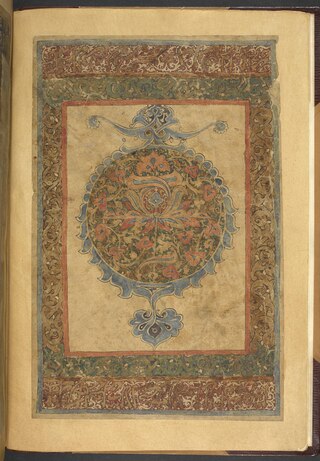
Jeremiah 3 is the third chapter of the Book of Jeremiah in the Hebrew Bible or the Old Testament of the Christian Bible. This book contains prophecies attributed to the prophet Jeremiah, and is one of the Books of the Prophets. Chapters 2 to 6 contain the earliest preaching of Jeremiah on the apostasy of Israel. Verses 2:1-3:5 dramatize the ending of a "marriage" between Yahweh and Israel, whereas verses 3:6-4:2 describe "the aftermath of recrimination" and partial restoration.

Ezekiel 16 is the sixteenth chapter of the Book of Ezekiel in the Hebrew Bible or the Old Testament of the Christian Bible. This book contains prophecies attributed to the prophet/priest Ezekiel, and is one of the Books of the Prophets. Biblical scholar R. E. Clements calls this chapter "an Old Testament parable of the prodigal daughter", describing a shocking illustration of ungrateful Jerusalem in contrast to God's enduring love to her. This chapter is often linked to Ezekiel 23, which deals with two daughters, symbolizing the Kingdoms of Israel and Judah.

















